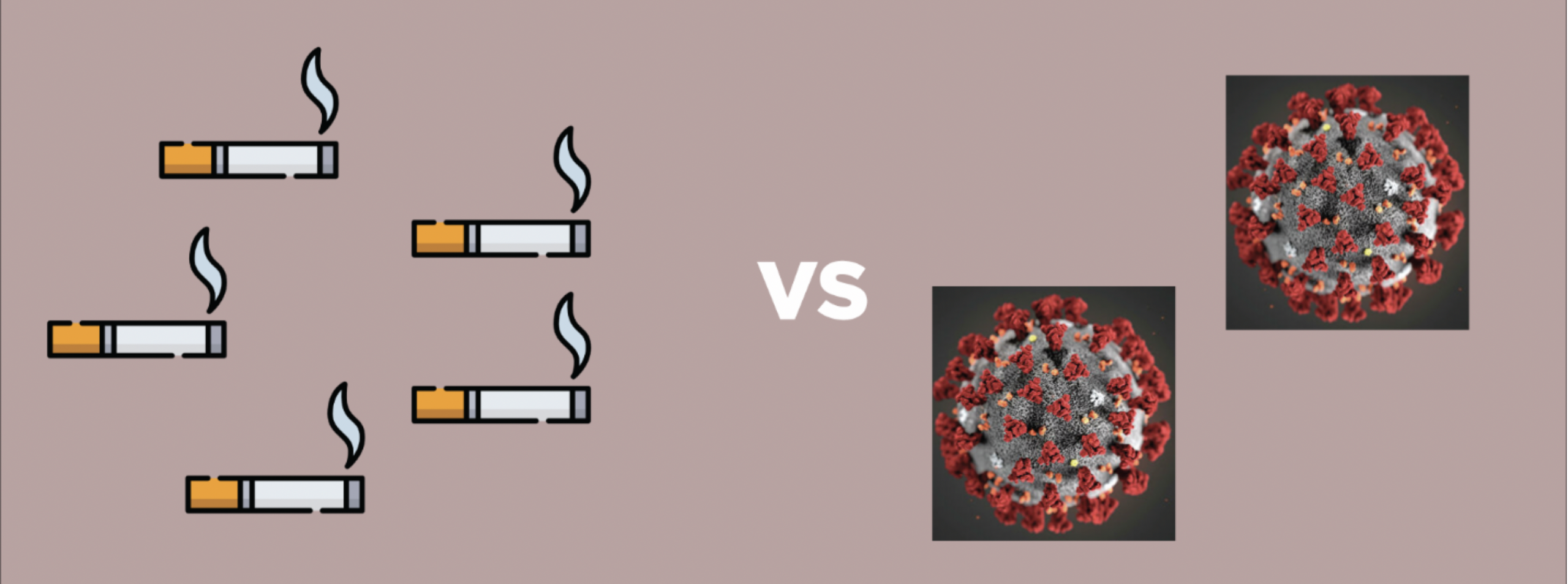Russian Telegram rumor claiming smoking protects from coronavirus spreads to Ukraine
Ukrainian fringe media spread the narrative that the share of smokers among people with COVID-19 was low, implying causation
Russian Telegram rumor claiming smoking protects from coronavirus spreads to Ukraine

Ukrainian fringe media spread the narrative that the share of smokers among people with COVID-19 was low, implying causation

Ukrainian media picked up an incorrect interpretation of a scientific article claiming that smoking decreases the chances of falling ill with COVID-19. The story received wide dissemination in social media, despite being wrong from the very beginning. The original report traced back to Russian fringe media and was subsequently deleted from the website without any correction.
Despite ongoing fact-checking efforts around the world, the infodemic surrounding the new coronavirus continues unabated. In some cases, rumors and conspiracies are created out of whole cloth, with no basis in reality. In other circumstances, as in this particular example, legitimate scientific research might be misconstrued or obscured, leading to erroneous conclusions and potentially dangerous behavior changes by the public.
The erroneous interpretation
The claim that smoking somehow offered COVID-19 protection began with a misinterpretation of a peer-reviewed scientific paper published on February 17, 2020. The paper, “Clinical characteristics of 140 patients infected with SARS-CoV-2 in Wuhan, China,” contained an overview of characteristics shared among people infected with CoVID-19. Based on a relatively small sample of 140 patients, the study described their existing health conditions, demographics, and lifestyle, including data on smoking habits. The authors noted that among this particular sample of patients, only nine of them had a history of smoking, with just two current smokers among them. The authors noted that the relationship between smoking and coronavirus disease, if any, remained unclear, emphasizing “underlying causes of the lower incidence of CoVID-19 in current smokers are still unknown.”
Two weeks following the release of the scientific paper, Russian outlet Sib.fm published an article that claimed smokers have 20 times lower risk to get sick with COVID-19. It referenced the Russian outlet Media Press as the source.

The original story on Federal Press is now deleted, but the narrative quickly spread. Along with Sib.fm’s version of the story, the Federal Press report appeared in Pugachevskoe Vremya, Shraibikus, Myseldon.com, Vazhno.ru, and on social media platforms like vk.com, twitter.com. None of the sources provided a link to the original scientific paper, yet they all made the unsubstantiated claim of smokers having 20 times lower risk to get CoVID-19.
Telegram origin
Digging deeper into the unfounded claim, it becomes clear that Federal Press was not the original source, despite it being the first media outlet to pick up the rumor. In fact, the original version of story appeared on Telegram five days earlier.
The story can be traced to the Telegram channel Tolkovatel (‘Expositor’), which has 22,406 members. The post was viewed 20,100 times. Tolkovatel was founded by Dmitry Tkachev, a former editor-in-chief of Russian Planet who censored reports from Crimea, ultimately leading to five journalists resigning in protest.
Linking to the scientific paper, the author of the Telegram post wrote:
Unexpected results of researchers on the risk of contracting the coronavirus among different population groups. Of the 140 infected people examined at Hospital №7 in Wuhan, only two were smokers (or 1.4% of the entire group). Whereas, based on statistics, out of 140 people, 32 should have been smokers. Thus smokers are 20 times less likely to become infected with coronavirus than non-smokers.
While acknowledging the results in the scientific paper were “preliminary,” it nonetheless made the incorrect assumption that smokers were significantly less likely to contract COVID-19. According to the Telegram analysis tool TGStat, the Telegram post was forwarded by several other channels, including ‘F**k you That’s Why’ (15,121 members), ‘Topics. The main thing (MainMedia)’ (19,246 members), ‘SocialTechnologist’ (3,424 members), ‘What’s happening’ (3,206 members), and ‘Templars’ (13 members). The Templars channel, despite its diminutive size, posed as a Ukrainian news channel and published the message on March 6, 2020, while all other channels forwarded it on February 27. Additionally, the version posted by the Templar channel copied an uncredited copy of the claim rather than forwarding it, thus making it harder to trace.
Ukrainian spread
A search of the word coronavirus in Ukrainian alongside with several variations used by fringe media (e.g, switching some letters to numbers or using the Latin alphabet for Cyrillic names) revealed that a Ukrainian translation of the Sib.fm article received the most social media engagements. The story was published on March 4 by the Ukrainian local media outlet Golos (‘Voice’) based in Ivano-Frankivsk. According to the social monitoring tool, CrowdTangle, the article received 163,523 engagements on Facebook, including likes, comments and shares.

The Ukrainian version of the story was copied by other websites, including AgroNews, Uzhgorod.in, UAnews, TyachivNews, and even appeared on Facebook and Instagram pages of Ukrainian city Kropyvnytskyi. According to analysis from the Ukrainian NGO Detector Media, the story also appeared in Belarussian media and some Ukrainian clickbait fringe media. Additionally, Russian-language versions were published by Rbc.ua, Golos.ua, (separate from the previous Golos website), and vv.org.ua. Only RBC.ua used the link to an original scientific article, whereas other sources referenced Federal Press.
Follow along for more in-depth analysis from our #DigitalSherlocks.

